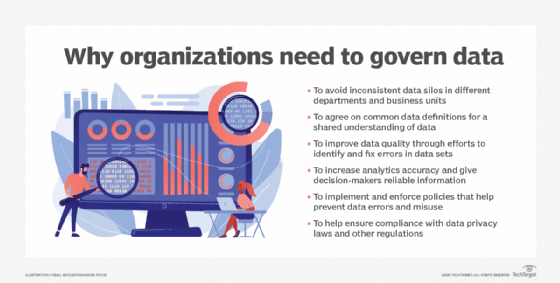Top benefits of data governance for businesses
Effective data governance provides a variety of benefits to organizations, including improvements in operational efficiency, data quality and business decision-making.
All companies face the need to measure and analyze their business performance. The bigger the organization, the bigger the problem, with various operating companies, business units and departments all having their own priorities and ways of doing things. That includes how they handle their data, which makes strong enterprise data governance a must.
For example, say you want to answer a seemingly simple question like, "Who are my most profitable customers?" To do so, you need to be able to gather data from around the enterprise on customers, the products they buy and the costs involved in marketing and selling to them. Even if you can do that, just figuring out how much revenue is associated with a given customer may be no trivial task.
For example, if it's a complex multinational company, you need to be sure your sales teams have correctly identified that operations they've invoiced for purchases are part of the broader entity. It's easy enough to figure out that Shell USA and Shell UK are part of parent company Shell PLC, but what about Pennzoil or Jiffy Lube? They're also Shell subsidiaries.
Why effective data governance is important
Further complicating things, the data to support profitability calculations and other types of analytics typically is scattered among different applications. Even if you have a standard ERP system, is there just one instance of it? What about classifications of customer, product and sales data? Do you have just one perfectly consistent set of data classification hierarchies? Even if you miraculously do, what happens when you acquire another company that has its own applications and classification hierarchies?
The reality is that almost all large companies have data silos that contain inconsistent data and can't be accessed by users throughout the organization. It requires a major effort to align data collection, creation, classification, formatting and usage across organizational boundaries. As a result, data governance has become one of the core elements of an overall data management strategy.

How data governance can help companies
Data governance is a set of processes to actively manage and control data and how it's used in an organization. It involves the development of internal data standards and policies, as well as procedures for enforcing them to help ensure that data is accurate, consistent and used properly. Here are the key benefits that a successful data governance program can produce in an organization.
1. Greater efficiency
If you have well-governed data and the ability to do business analytics with it, you can improve operational efficiency in many areas. A rule of thumb is that 20% of your customers provide 80% of your profits; accurately measuring which customers are best for the business enables you to better target your marketing and sales investments. By understanding product profitability, you can weed out underperforming product lines and invest more money in ones that show promise. Analyzing business processes can reveal opportunities to improve them -- but only if the data underlying those processes is reliable.
2. Better data quality
Despite significant IT investments, maintaining good data quality remains an intractable problem. A study published in 2019 by software vendor Experian Data Quality found that 95% of organizations feel the impact of poor data quality; in more concrete terms, respondents to a 2020 Gartner survey estimated that low-quality data cost their organizations an average of $12.9 million annually. The effects of data quality issues can be profound, which is why data quality improvement efforts are a key part of data governance programs. Improved data quality helps reduce operational errors and increase analytics accuracy. Although there are no magic bullets, a good start includes creating a data quality mindset and regularly auditing and measuring data quality levels as part of the governance process.
3. Better compliance
In healthcare, financial services and other industries, there are significant penalties for poor regulatory compliance. For example, pharmaceutical companies are required by law to track their marketing and advertising expenditures. Failures to comply with regulations have led to multiple billion-dollar settlements and others amounting to hundreds of millions of dollars with the U.S. Department of Justice since 2009. With these sorts of sums involved, accurate and auditable reporting of data is crucial. GDPR, the California Consumer Privacy Act and other data privacy laws also add new compliance requirements on the use of personal data about customers in various sectors. Without solid data security and privacy protections underpinned by effective governance, companies could face fines and lawsuits.
4. Better decision-making
If your organization has a sound base of data, it will be able to confidently make better business decisions. Executives and workers can plan, monitor and act on marketing promotions, price adjustments, product strategy, customer service and other aspects of business operations in a more informed way. That all depends, though, on end users having access to accurate data for strategic planning, business intelligence and advanced analytics applications.
5. Improved business performance
Ultimately, the benefits described above should lead to increased revenue and profits. It really does seem that high-performing companies take data governance more seriously than other organizations do. For example, a 2018 McKinsey survey found that "breakaway companies" were twice as likely to strongly agree that their data governance strategy enabled them to identify and prioritize important data assets. Improving business performance should be the goal of any corporate initiative, and data governance clearly has an important role to play in that.
6. Enhanced business reputation
In addition to tangible financial gains, effective data governance can help boost how an organization is regarded by customers. For example, high-quality data enables better interactions with customers by sales and customer service reps. Ideally, that leads to higher customer satisfaction levels and increased customer loyalty, which should further drive business performance improvements.
How to build a data governance strategy
Data governance used to be seen as an IT problem, but there has been an increasing realization that the IT department doesn't have the authority to set and enforce uniform data standards. Business managers need to drive such initiatives; to ensure that they do, a data governance program typically includes a steering committee of senior executives and other data owners that makes policy decisions. It should also resolve arguments over which data definition or classification is the "correct" one, with the authority to make business units change their systems and processes to conform with the designated standard.
The steering committee is supported by a data governance team that manages the program and by data stewards -- usually, data-savvy business users throughout the organization who have at least part-time responsibility for overseeing data sets and enforcing the data standards. In a data governance benchmarking database run by my analyst firm, The Information Difference, the average company has four full-time data governance staff and nine part-time data stewards.
Once the governance structure is in place, how do you achieve your goals and get the benefits that an effective data governance initiative provides? The participating companies in The Information Difference benchmark database take a detailed survey. Statistical analysis of the responses shows that the companies that reckon themselves most successful at data governance have significantly different behaviors than those that rate themselves less successful.
In particular, successful data governance programs include the following:
- a clear process for resolving disputes;
- detailed documentation of business processes;
- regular data quality audits;
- a risk register that lists data-related business risks;
- data models for key business data domains; and
- policies to limit access to data that's sensitive or critical to the business.
These programs also have a mission statement, a business case, training on data governance, and a process for communicating progress and results. The various steps outlined here show you the path to a successful program that will deliver the expected benefits of data governance in your organization.








